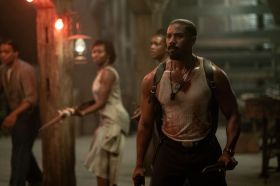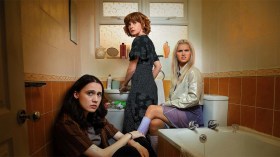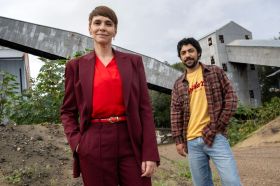‘Art shows us again and again that if we look closely, openly at a small thing, we can see lots in it. So here’s a small thing.’
In his latest cinematic essay on cinema, filmmaker and critic Mark Cousins steps through a series of intimate moments, most from the movies, and one from real life. The latter provides the context for his analysis of the former, a framing device that anchors an almost frame-by-frame dissection of integral scenes from important features. From a seemingly standard home video of his niece, Laura, and his nephew, Ben, playing and fighting, he finds inspiration for a look back through the history of kids on screen – not in chronological order, but synchronised with their actions. This is, in every way, A Story of Children and Film.
First, Laura and Ben are reluctant in the presence of the camera, a sense of shyness and introspection that Cousins also finds in efforts as varied as Chen Kaige’s Yellow Earth and Steven Spielberg’s E.T. The Extra Terrestrial. Then, when their northern accents are heard, he probes the trappings of social class, drawing parallels with Andrei Tarkovsky’s The Steamroller and the Violin and David Lean’s Great Expectations, among others. Friction emerges, on par with the likes of Mohammad-Ali Talebi’s The Boot and Jafar Panahi’s The White Balloon. A performative personality takes over in a parade of theatricality before the lens, reminiscent of a tradition evidenced in both Ingmar Bergman’s Fanny and Alexander and Wes Anderson’s Moonrise Kingdom.
And so the documentary continues, examining the short film made in Cousins’ house one ordinary morning, then probing comparable presentations throughout the wealth of depictions of youth in cinema. The filmmaker makes plain that he will be sticking to films where kids are the focus, not ones that tell what adults think of them, and this perspective is paramount to the compilation’s pondering. Whether acting as surrogate parents, or displaying violent tendencies, his chosen clips demonstrate the collective childhood experience immortalised in features. When he reaches the limits of his family vignette, Cousins steps outside his own bounds to consider other recurrent elements in movies, across genres, nations, time periods, moods, narratives and styles.
In keeping with the approach and structure established in his epic 15-hour The Story of Film: An Odyssey, Cousins’ much more concise follow-up examines film as form and through themes. His descriptions are lyrical, focusing as much on composition as plot; his selections are seamlessly compiled and conscientiously representative of the very best of youth-oriented filmmaking since the advent of the medium. Famous imagery, such as the final scene from François Truffaut’s The 400 Blows, understandably earns its moment, yet the spirit of discovery courses through the documentary. Again in fitting with the director’s previous work, the educational function perseveres. Walking away with a long list of features to watch is inevitable.
Though the overall tale it weaves is one of universality, A Story of Children and Film is at once intimate and eclectic, eccentric and individual in its playful portrait of 53 films from 25 countries. By studying the details, Cousins relishes the delights, in an effort tailor-made for cinephiles.
Rating: 4 out of 5 stars
A Story of Children and Film
Director: Mark Cousins
UK, 2013, 106 mins
Sydney Film Festival
http://www.sff.org.au/
4 – 15 June
Actors:
Director:
Format:
Country:
Release:





